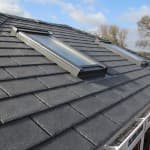Commercial slate roofs offer beauty, long-term value
Slate roofs are a perfect combination of long-term durability, performance and beauty. And, while slate roof costs significantly more than other roofing systems such as cedar shakes or cedar shakes, they can last 100-150 years. In fact, there are buildings whose slate roofs were installed centuries ago.
 The key to a long-lasting installation worth the upfront slate roof cost is precision. From material selection to laying each piece of slate, your roofing contract must aim for perfection.
The key to a long-lasting installation worth the upfront slate roof cost is precision. From material selection to laying each piece of slate, your roofing contract must aim for perfection.
Here are some things a skilled roofing contractor will consider when repairing, replacing or installing your slate roof:
- Planning slate courses for headlap
Commercial slate roofs are laid in courses—or rows. Your roofing contractor will work to line these courses up perfectly so that there is ”headlap.” Headlap is what ensures slate roofs are watertight. Essentially, a course should overlap the top—or head—of the slate two courses below. Ideally, there will be at least 3 inches of headlap for each and every course. Headlap less than 2 inches—or no headlap at all—means your slate was not installed properly. Your contractor might use more than 3 inches headlap depending on the pitch, or slope, of your roof. - Underlayment for slate roofing
You don’t need any. A roofing contractor experienced with commercial slate roofs will know that slate, when correctly installed, requires no underlayment for waterproofing. They might, however, use underlayment for added insulation or to cushion the pieces of slate during installation. - Using the right roof deck
While underlayment isn’t necessary, using the proper kind of roof deck, is. To ensure the durability of your slate roof and justify the upfront slate roof cost, 3/4 – to 1 1/2-inch kiln-dried or rough lumber board should be used under your commercial slate roof. Under no circumstances should your install commercial slate roofs atop plywood or particle board—it will reduce the usable life of your slate roof. - Choosing slate for your roof
American standard slate boards are the best choice for your commercial slate roof. Each board comes with pre-cut, indented nail holes. The indents leave space for the head of each copper or stainless steel nail so it doesn’t place too much pressure on the overlapping slate boards.ASTM, a reputable third-party standards organization, has developed a series of tests by which they measure the quality and predicted durability of slate used for roofing applications. Their standard for slate—ASTM C406—categorizes slate into three categories: S1, S2 and S3. To ensure your roof lasts long into the future and to be sure of the weatherproofing qualities of your slate, make sure your contractor uses only S1 grade slate. - Installing flashing and ridge caps to prevent water penetration
For a truly watertight commercial slate roof, your roofing contractor will install flashing on valleys and around dormers or chimneys, where water might otherwise leak through. Typically, higher density copper—such as 20 oz. copper—is used for high-risk areas like valleys, the low point on your roofing system where water naturally flows toward. 16 oz. copper is usually sufficient for flashings on ridges and dormers. Flashings bridge the gap between the slate boards and seams, preventing leaks and water damage within your facility.
The most important consideration for a commercial slate roof is, of course, the roofing contractor you use, as they can make or break—literally—its long-term durability. That’s why you should schedule a consultation with St. Louis’ commercial slate roof experts at Wildwood Roofing & Construction.
We know slate. We know installation best practices, have connections with slate manufacturers and we pass our knowledge and its value along to our clients. Plus, we use only S1 grade slate boards. The proof is, of course, in the finished product. We’re proud of every commercial slate roofing project we’ve completed—and so are our clients.
Schedule a cost- and obligation-free consultation today and see why facility owners throughout St. Louis recommend us for commercial roofing projects.

